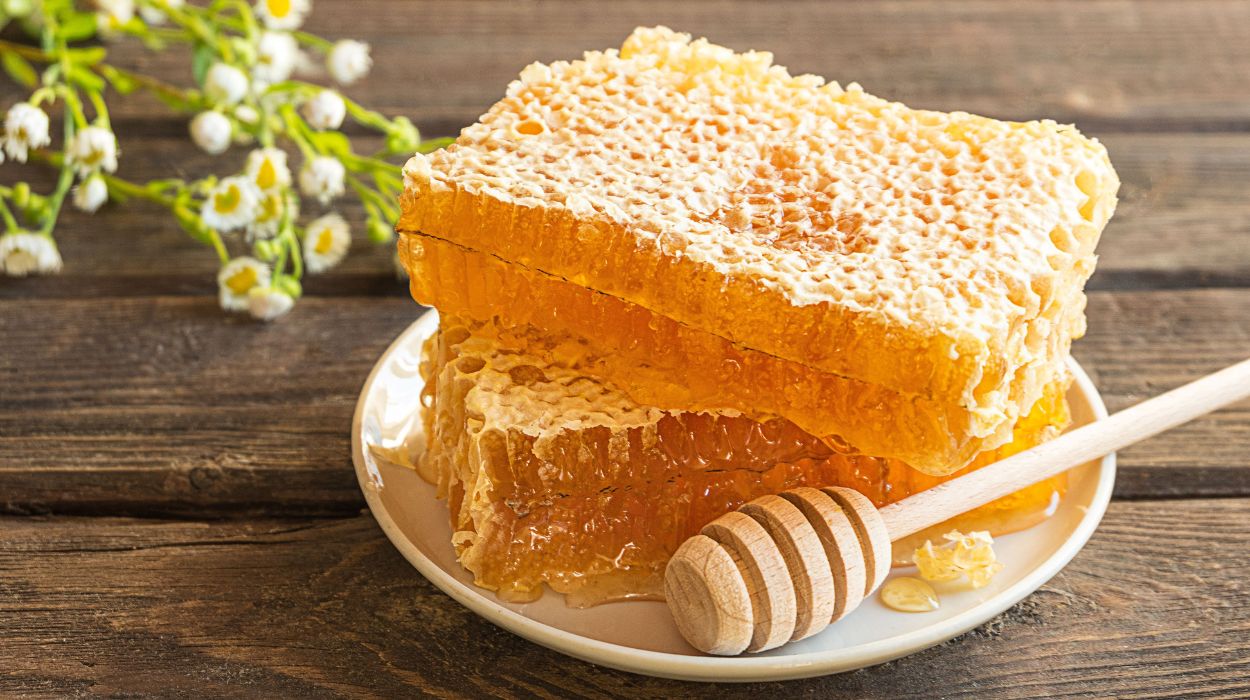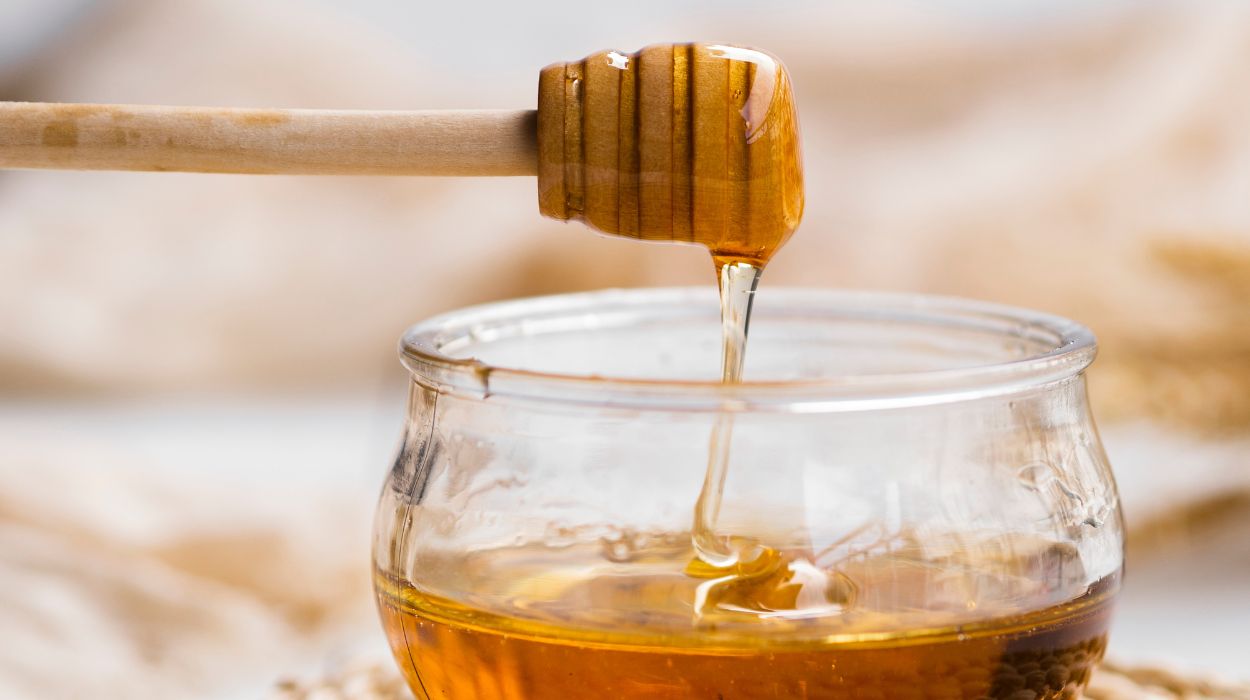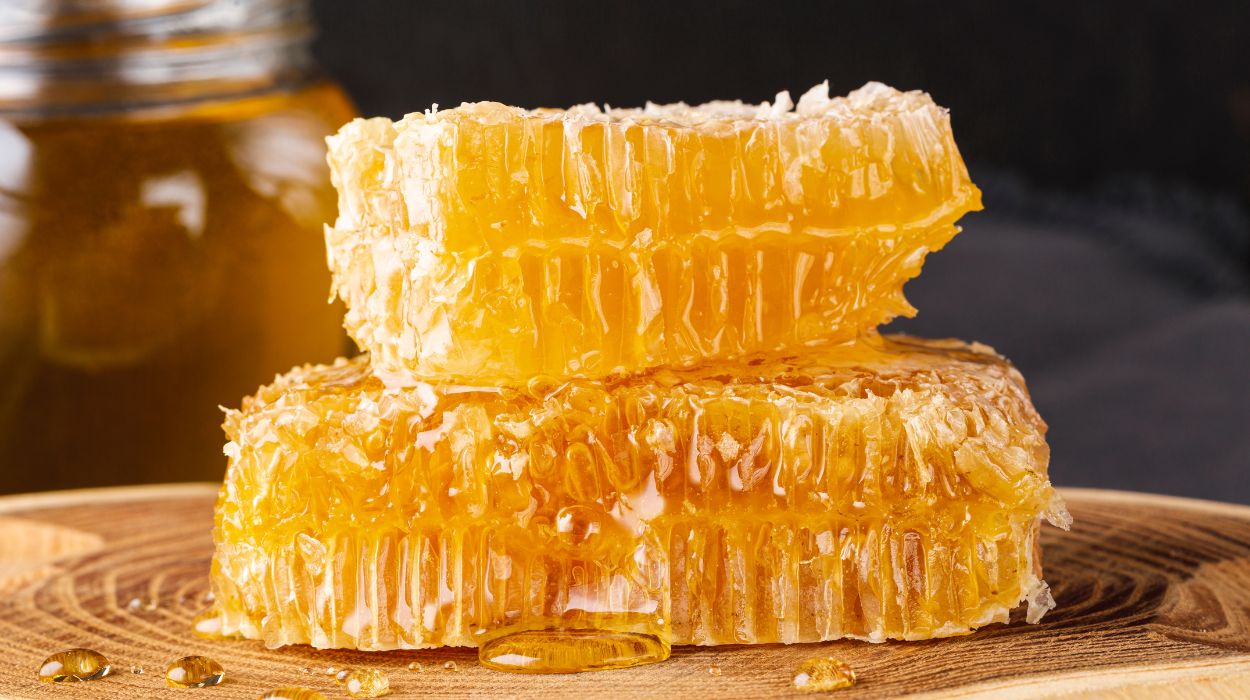 Evidence Based
Evidence Based
Evidence Based
This article is objectively based on relevant scientific literature, written by experienced medical writers, and fact-checked by a team of degreed medical experts.
Our team of registered dietitian nutritionists and licensed medical professionals seek to remain objective and unbiased while preserving the integrity of any scientific debate.
The articles contain evidence-based references from approved scientific sites. The numbers* in parentheses (*1,2,3) will take you to clickable links to our reputable sources.
Is Honey Good For You? Health Benefits Of Honey 2024

Eating honey and using it topically can be good for you and may provide you with health benefits. Many people use this superfood for their hair, skin, and more.
Bees make honey from flowers by using the nectar they collect and mixing it with enzymes to craft this sweet natural substance. Manufacturing processes can change the nutritional value of the honey, though, so finding out what kind of honey is more beneficial can help.
Switching from sugar to honey can be helpful, for example, if you’re on a weight loss journey, managing blood sugar levels, or have allergy symptoms. For one, honey can be sweeter than sugar, so you don’t have to use it as much to curb your sweet tooth.
Why is honey good for you? Let’s discuss honey’s health benefits, different types of honey, its nutritional value, and how to add honey to your food regimen.
Health Benefits Of Eating Honey
- Good for your liver
- Boost energy
- Improve gut health
- Improve skin health
- Get soft lips
Impressive Health Benefits Of Honey

Honey is one of the finest foods provided by nature. It’s a rich source of nutrients and can be used to create one-of-a-kind products, even in the healthcare industry. In addition, it contains vitamins, minerals, amino acids, enzymes, and antioxidant content that promote health.
One of honey’s most popular uses is for upper respiratory infections, and it is useful in many cough medicines to help soothe the throat and reduce coughing. In addition, honey has antiviral properties and can also reduce inflammation related to asthma.[1]
The phenolic acids that honey contains promote its anti-inflammatory properties, and honey has anti-cancer activity[1] against different tumors. An enzyme[2] in honey creates hydrogen peroxide and provides antibacterial benefits.
Honey may help prevent heart disease[3] and helps to protect the heart by helping to improve cholesterol levels and high blood pressure.
Good For Your Liver
But is honey better for you than sugar? Choosing to substitute white or refined sugar with natural honey, like raw honey, can have many potential health benefits. For starters, white sugar, or table sugar, can raise blood sugar levels; but honey can make a good alternative since it comes in with a relatively low glycemic load, and you’re less likely to experience blood sugar spikes when the honey you consume is in moderation.
Blood sugar control can be helpful if you have or are at risk for liver disease. Honey is good for your liver because its phenolic compounds help protect it from the damage free radicals[4] can cause.
Boost Energy
Honey may be the answer if you’re looking for an energy boost. It’s a healthy source of carbohydrate fuel that Olympians in ancient Greece would consume for the energy to run.
Improve Gut Health
Honey can also provide you with health benefits from its vitamins, minerals, and antimicrobial properties that also promote good gut microbiome[1] balance needed for rest and a good night’s sleep that prepares you for a productive day ahead.
Improve Skin Health
Is honey good for your skin? Many people eat honey but also use it as a traditional medicine to heal wounds.[5] Honey studies show that it has antimicrobial, anti-inflammatory, and anti-bacterial properties that increase the healing abilities of the skin.
Since wound treatment with topical honey can fight against harmful bacteria, it can be successful at helping to heal skin injuries like leg ulcerations and burns. Honey also has an antifungal activity that works to heal Candida infections.[1]
Honey helps to reduce inflammation and bacteria, which is helpful with acne. Yeast rashes, eczema, scarring, and psoriasis may also benefit from honey by applying it to the area for several minutes. Making sure you use raw honey will ensure it still contains the properties you need to help your skin and face.
Get Soft Lips
Honey is good for your lips because it can provide soothing relief for chapped lips and help heal any open areas with its wound-healing abilities. Honey is a natural humectant that draws moisture into the area it’s on.
Nutrition Value

According to the USDA,[6] one tablespoon of raw honey brings has around:
- 63 calories
- 17 grams of carbohydrates
- Zero fat
- <1 gram of protein
- <1 gram of fiber
It also contains vitamins and minerals like:
- Calcium
- Iron
- Potassium
- Magnesium
- Zinc
- Folate
Types Of Honey That Are Good For You
The honey that bees create can be consumed unfiltered, but many people eat processed honey after it goes through heat and filtering processes, which can reduce its nutritional value.
Let’s take a look at different types of honey and whether or not they are good for you
Raw, Organic Honey
Raw honey is good for your health because it contains more health benefits than processed, pasteurized honey. Honey’s anti-inflammatory effects can be great for your health, but processing honey exposes it to high temperatures, and this destroys nutritional value. Even if the label says “pure honey,” but not raw, then it’s gone through processing.
Plus, processed honey can contain added sugar. Processing also removes the bee pollen and bee propolis,[7] reducing health benefits. The darker the honey, the more antioxidants it contains. Antioxidant properties help fight off cell-damaging free radicals. When you can, choose local, raw honey.
Manuka Honey
Manuka honey comes from one plant, the manuka tree, and costs much more than regular honey. While it may not be as good for your pocket, manuka honey has higher antiviral activity[8] than regular honey. It boasts antibacterial properties that have people consuming it for health benefits relating to digestive issues and gum disease or using it for wound healing for partial thickness burns.
Clover Honey
Clover honey specifically comes from the bees collecting nectar from clovers. Clover honey generally has the same health benefits as the honey that comes from flowers, and it’s essential to find raw clover honey instead of processed honey for the highest nutrition profile.
Honeycomb
Honeycombs are the bees’ warehouses. They make little compartments out of beeswax and use them to store their larvae and pollen and make their honey inside of the comb. You can eat honeycomb, which may contain not only honey, but royal jelly, bee pollen, and propolis which can provide many benefits for your health.
Is Honey Unhealthy?
Honey is generally safe to consume, but if it’s not eaten in moderation, like any other food it may promote weight gain. However, the potential benefits of honey, like its anti-inflammatory properties, outweigh the risk for most. Here are a few harms associated with honey.
You may have heard that babies under 12 months should not have honey. Infant botulism is a condition said to affect children younger than one year old who may ingest honey that may be contaminated with a microorganism called Clostridium botulinum. While this isn’t in every honey, as a baby, their gut is not developed enough to fight this off and can cause serious illness.
Other toxins like 5-HMF have been found in processed, pasteurized honey, likely due to the heating and storing environments. High amounts of this have the potential to promote cancer.
There are flowers that you would not want honey from. The nectar of Azalea pontica and Rhododendron ponticum flowers contain toxins that produce mad honey[9] and may cause harmful health issues like heart problems.
How To Consume Honey?
Consuming honey in moderation is key. Honey usually has a long shelf life, but you may notice crystallized honey if it sits around for long enough. The crystals are still fine to consume, but gently warming them up will melt them into a smooth honey texture again.
You don’t have to keep honey in the fridge, but you’ll want to make sure it’s in an airtight container to maintain its high quality and avoid contamination.
With honey’s sweet taste, there are many ways to add it to your diet, including:
- Sweetening plain yogurt
- Add-in to overnight oatmeal
- Coffee or tea sweetener
- Honey mustard and honey vinaigrette dressing
- Drizzled over waffles and pancakes
- Nut butter and honey sandwich
The Bottom Line
There are several potential health benefits of honey. Studies show evidence of its anti-inflammatory properties and ability to reduce the risk of heart disease. Honey can help with respiratory issues and keep your hair and skin healthy. It is a natural resource for treating burns when you need wound care.
If you have the choice between honey and regular sugar, choose raw honey. Honey is generally safe for consumption and can have beneficial effects, except for children younger than 12 months who need to avoid it.
+ 10 sources
Health Canal avoids using tertiary references. We have strict sourcing guidelines and rely on peer-reviewed studies, academic researches from medical associations and institutions. To ensure the accuracy of articles in Health Canal, you can read more about the editorial process here
- Cianciosi, D., Forbes-Hernández, T., Afrin, S., Gasparrini, M., Reboredo-Rodriguez, P., Manna, P., Zhang, J., Bravo Lamas, L., Martínez Flórez, S., Agudo Toyos, P., Quiles, J., Giampieri, F. and Battino, M. (2018). Phenolic Compounds in Honey and Their Associated Health Benefits: A Review. Molecules, [online] 23(9), p.2322. doi:10.3390/molecules23092322.
- Bizerra, F.C., Da Silva, P.I. and Hayashi, M.A.F. (2012). Exploring the antibacterial properties of honey and its potential. Frontiers in Microbiology, [online] 3. doi:10.3389/fmicb.2012.00398.
- Bt Hj Idrus, R., Sainik, N.Q.A.V., Nordin, A., Saim, A.B. and Sulaiman, N. (2020). Cardioprotective Effects of Honey and Its Constituent: An Evidence-Based Review of Laboratory Studies and Clinical Trials. International Journal of Environmental Research and Public Health, [online] 17(10), p.3613. doi:10.3390/ijerph17103613.
- Erguder, B.I., Kilicoglu, S.S., Namuslu, M., Kilicoglu, B., Devrim, E., Kismet, K. and Durak, I. (2008). Honey prevents hepatic damage induced by obstruction of the common bile duct. World Journal of Gastroenterology, [online] 14(23), p.3729. doi:10.3748/wjg.14.3729.
- Henriques, A. (2006). Free radical production and quenching in honeys with wound healing potential. Journal of Antimicrobial Chemotherapy, [online] 58(4), pp.773–777. doi:10.1093/jac/dkl336.
- Usda.gov. (2022). FoodData Central. [online] Available at: https://fdc.nal.usda.gov/fdc-app.html#/food-details/169640/nutrients
- Wagh, V.D. (2013). Propolis: A Wonder Bees Product and Its Pharmacological Potentials. Advances in Pharmacological Sciences, [online] 2013, pp.1–11. doi:10.1155/2013/308249.
- Watanabe, K., Rahmasari, R., Matsunaga, A., Haruyama, T. and Kobayashi, N. (2014). Anti-influenza Viral Effects of Honey In Vitro: Potent High Activity of Manuka Honey. Archives of Medical Research, [online] 45(5), pp.359–365. doi:10.1016/j.arcmed.2014.05.006.
- Ullah, S., Khan, S.U., Saleh, T.A. and Fahad, S. (2018). Mad honey: uses, intoxicating/poisoning effects, diagnosis, and treatment. RSC Advances, [online] 8(33), pp.18635–18646. doi:10.1039/c8ra01924j.



